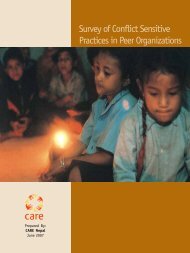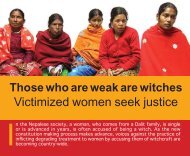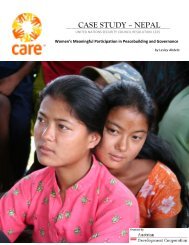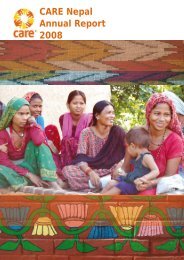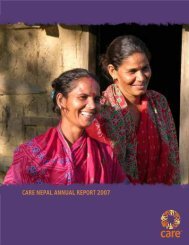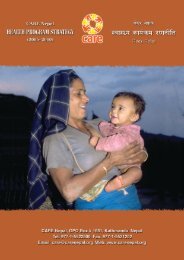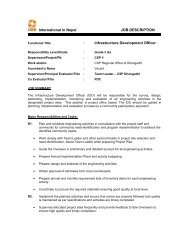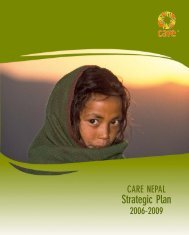Untitled - Care Nepal
Untitled - Care Nepal
Untitled - Care Nepal
You also want an ePaper? Increase the reach of your titles
YUMPU automatically turns print PDFs into web optimized ePapers that Google loves.
It was confirmed that the work load of men<br />
and women were not distributed equally.<br />
Women have to work inside the house as<br />
well as have to support activities out side of<br />
the house.<br />
A FGD participants brahmin and chettri<br />
women in Chitwan put their view strongly,<br />
“Here we (women) cannot work according<br />
to our wishes. We have many restrictions<br />
and conditions. Men and women come<br />
home together from working in the fields<br />
but as women have small kids, they have to<br />
look after them as well as cook food. After<br />
men eat food they say they are tired and go<br />
for sleep and don’t look after the kids. Thus<br />
women have to work carrying children on<br />
their backs”.<br />
At the same way and same caste group of<br />
women in Makawanpur put their view,<br />
“There is no help from men’s side in any<br />
activity. We cannot talk about men at home;<br />
we go to fields and talk about them. Men<br />
don’t want to help women and even if they<br />
do then, they are criticized in this<br />
community”.<br />
Furthermore if women get involved in<br />
community activities, they get blamed of<br />
being cleverer and ahead of men (used to<br />
say “pothi basyo”).<br />
Similarly, women from Sarlahi mentioned<br />
the same thing that they were not supported<br />
by their family members at home. One of<br />
the women shared that there were no one<br />
to support her in household work even when<br />
she became sick.<br />
In addition, it was reported that<br />
discrimination of women usually began at<br />
home. They were scolded or beaten if they<br />
went outside without the permission of their<br />
parents. People started to suspect a woman<br />
as having sexual relationships with other<br />
men if she returned home late or went<br />
outside without taking consent from home.<br />
Due to such restrictions women felt limited<br />
to learn and grow. Parents in general think<br />
that women and girls should stay at home<br />
(chori manche gharmaii basnu parcha) and should<br />
do household work.<br />
“Women are told not to travel at night time and<br />
if they do they are scolded. They say daughters<br />
should stay at homes (chori manche gharmaii<br />
basnu parcha) It is said that if women travel they<br />
will have sexual relation with other people and will<br />
not be able to get married later”.<br />
“Daughters are not kept at homes when they<br />
have 1st menstruation due to the belief that<br />
brothers would see them. Thus they are made to<br />
sleep in sheds. They have to wear other dress<br />
(not the normal clothes that they wear usually)<br />
when they have menstruation. They have to<br />
sleep separately in cold weather. During those<br />
situations, we feel that we have committed the<br />
greatest mistake for being born as a girl”.<br />
(FGD with youth in Chitwan)<br />
However, Janajati women mentioned that<br />
there were not such traditions and rituals<br />
that put women in difficulties.<br />
20<br />
Psychosocial Issues of<br />
Women affected by conflict



